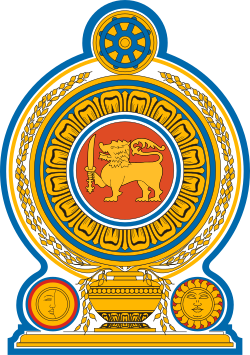This article needs additional citations for verification .(January 2021) |
| අධිකරණ අමාත්යාංශය நீதி அமைச்சு | |
 | |
 | |
| Agency overview | |
|---|---|
| Jurisdiction | Government of Sri Lanka |
| Headquarters | Superior Courts Complex, Colombo 12 6°56′07″N79°51′43″E / 6.935221°N 79.861824°E |
| Minister responsible | |
| Agency executive |
|
| Child agencies |
|
| Website | moj |
 |
|---|
The Ministry of Justice, Prisons Affairs and Constitutional Reforms [2] [a] is the cabinet ministry of the Government of Sri Lanka responsible for the implementation of policies, plans and programmes for the administration of the country's justice system, and thereby administers its courts and prisons. Wijeyadasa Rajapakshe is the incumbent Minister of Justice as of 20 May 2022. [3]










